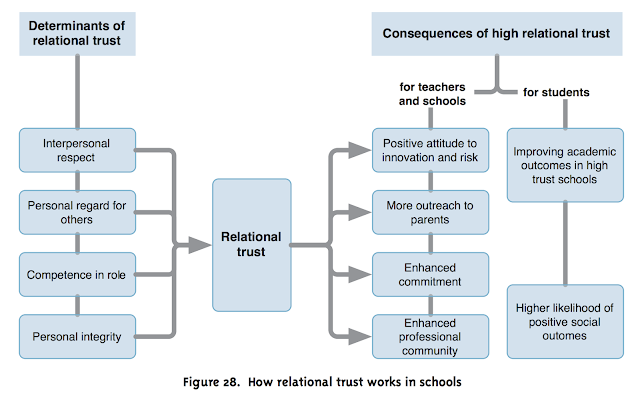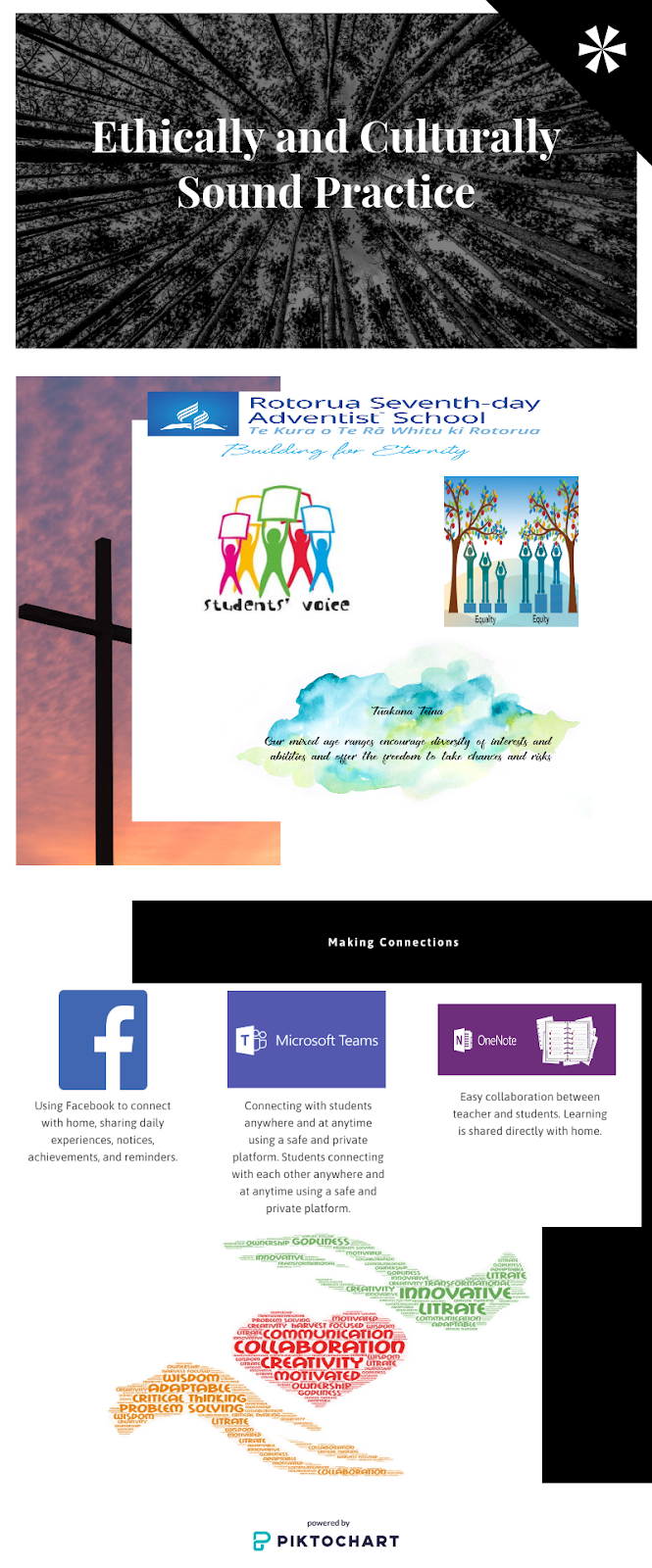The Futures of Learning - Evaluation and Summary
Learning is about
the process of developing sufficient surface
knowledge and then move to deeper
understanding such that one can appropriately transfer this learning to new tasks and situations. (Hattie
Conference 2018 Brisbane)
Personalised
learning is about meeting the needs of individuals and their interests.
Learners are more
successful at becoming efficient with tasks when they build strong
metacognitive abilities, reflect on new ideas learned, and integrate that
information with their existing or prior knowledge and skills. The process they
use to adopt the new knowledge will support all further learning. When the new
learning becomes second nature, this will provide further creativity and
originality. The awareness and understanding of ones own thought processes -
Metacognition, is nurtured through learning that fosters participation, is
personalised and customised, is focussed on problem-based learning, and
contains activities that require peer collaboration. These learning types
result in Deeper Learning because individuals aren't expected to memorise and
repeat facts and knowledge that are of no interest to them, instead when
content and context is of interest to individuals, they are able to comprehend
difficult concepts and ideas, evaluate new ideas, and summarise their
understanding based on reactions and insights.
While programs need
to be personalised, teachers also need to ascertain what knowledge individual
students have obtained and decide whether to move forward with learning or to
revisit some of the process already visited in more depth. (Scott, C. 2015)
The current
education system is broken and learner needs are often unclear as learners move
from one sector to another, ie. Primary to Intermediate to Secondary School.
This is not necessarily due to the pedagogy of teachers but the policies and
pressure given from the government to meet certain standards and achievement
levels. With personalised learning,
learners approach problems in their own way, explore and grasp ideas at their
own pace. Due to restraints within the New Zealand education system and
curriculum, teachers have become resistant to change or hesitant to change
their practice to enable their learners this opportunity of personalised
learning. Teachers who crave change and are effective in 21st Century teaching
create regular opportunities for learners to select the types of experience
they want to further investigate and grow their curiosity. This doesn't mean
that teachers hand all responsibility over to their learners. Learners are more
successful when they are taught how to learn as well as what to learn and
therefore, teachers need to design and plan activities that match the interests
and needs of learners and the curriculum.
(Scott, C. 2015)
Teachers need to
encourage collaboration and communication, engage with and motivate learners,
and cultivate creativity and innovation. Unknowingly, teachers are using
technology in their everyday lives. They use social media, emails and other
online forums to communicate and collaborate. They use computers to create
learning paths. They are interior designers with how they create a stimulating
learning environment. All this has been a learning journey for teachers - using
technology use hasn't come naturally. Teachers now need to turn these skills
around and allow their students to learn the same way. Opening up learning
through the technology promotes learning with no boundaries (Anytime and
Anywhere). (Scott, C. 2015).
John Hattie's Effect
Sizes state that Collective Teacher Efficacy has the highest impact on learners
and is in the number spot with an effect size of 1.57. Therefore, as a
collective group, teachers need to work together to embrace 21st century
learning and accept that their roles as teachers, while remain central to the
education system, must make the move away from imparting knowledge to guiding
the learning. Teachers need to become coaches that provide guidance to help students develop skills and learn
processes that enable them to achieve their learning goals. (Hattie, J. 2012)
Summing up - A lot
of what is now being discussed about education isn't new. In the early 19th
Century, Ellen White, an American Christian Pioneer and author of
"Education", referenced education practices that we are referring to
now in the 21st century. Comparisons were made using words that were almost
identical. Comparisons looked at
neuroplasticity, holistic, metacognition, education for employability, and
Visible Learning and Heutagogy.
Education has always been about the learner. (White, E.)
Valerie
Hannon speaks about a very eye opening issue that, while it affects all areas
of humanity, it has a direct link to how education needs to be viewed and
turned around. Everything starts with a story. We tell ourselves about
ourselves. What we think and talk about is what will happen due to influence.
Everything
has to have a purpose - start the new story with a purpose - this should be
learning to thrive in a transforming world. There are 3 main reason why we are
not thriving in our current state:
- Our planet - the 6th extinction is caused by humans
- Apotheosis of technology - New geological age - which is the actions of humans
- Our evolution - climate change
These
are a huge problem because we are not controlling the rise in the surface
temperature of the earth. This means we are slowly destroying our ability to
survive.
Another
area that is causing limitation for our species to thrive is Technology and
Control. There are 3 main concerns in this area:
- Scales of job disruption by robotics
- Artificial intelligence
- Global connectivity - having the ability to share, collaborate and communicate any time and anywhere, which is slowly affecting our relationships and ability to build new relationships.
Artificial
intelligence is causing potential job automation due to the introduction of
robots. 30% of jobs will be impacted by artificial intelligence by 2030. Low
achievers will be impacted the most by work availability. This means that
employment needs to be viewed very differently. There are already robots acting
as teaching assistance in some schools.
But
with some of the new innovations in robotics has meant evolution is also in our
hands - Genetic Engineering and Human Enhancement Technology.
What
does all this mean for education? Well, there are four interrelated
competencies that Valerie talks about which can not be ignored:
- Education needs to be based on learning goals. These need to focus on being how to live sustainably, how to protect earths eco-systems, and acquiring global competence.
- Societal - to navigate a disrupted and uncertain landscape of work, and to reinvent a participative, authentic meaningful democracy that is recreated by the kids for them. Societies thriving really well are not the richest, but they are the ones who distribute their resources equitably.
- There are the interpersonal competencies like building relationships with real people to learn empathy. Learning morals and values from other generations. Technology is penetrating how we make rich relationships because of the impersonal requirements that screens give you.
- Lastly, Intrapersonal competencies and feeling a sense of security in ones self. Never being disconnected from who you are and where you are from. (Hannon, V. 2018)
Kids
need to learn to learn new skills, to learn re-learn, and love learning. As
educators, we still have a role to play that technology, no matter how
advanced, can't do. Technology can not replace the empathy and personal touch
that humans give to one another. Teachers are what can keep connectivity alive
between students. They are fair and impartial. They can teach the process of
learning and relearning and can teach students how to be life long learners
where skill becomes the forefront of thriving beyond 2030.
(Refer to Onenote Contemporary Teaching Week 1)
References:
Hannon, V. (2018) Korero Matauranga: What should
education be? https://www.youtube.com/watch?v=KbNcM7Qrr2Q
Hatti, J. (2012). Visible Learning For Teachers -
Maximising Impact on Learning
Scott, C. (2015). The Futures of Learning 3: What
kind of pedagogies for the 21st century?
White, E. (?) Education



Comments
Post a Comment